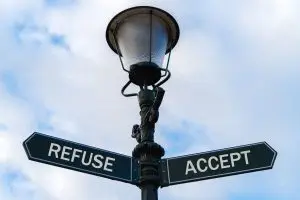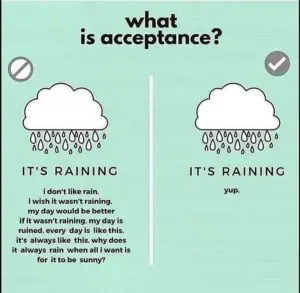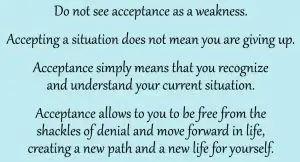Radical Acceptance

What you accept & face, you conquer.
My nephew just got out of rehab this week where he was treated for drug addiction. One of the methods that he was used to help escape from his addiction is called Radical Acceptance. Think of it as simply acknowledging reality, without agreeing with it. We fight reality by judging a situation. We fight reality when we say: “It should or shouldn’t be this way,” “That’s not fair!” or “Why me?!” Fighting reality this way only creates suffering. While pain is inevitable in life, suffering is optional. Suffering is what happens when we refuse to accept the pain in our lives.
One constructive, but difficult, way of understanding our current response to the covid-19 crisis is our inability to accept that we cannot control it’s spread. Yes, we can, perhaps, reduce the numbers of deaths, but accepting the reality that we cannot “win’, that we are not in control, is something that no nation has, so far, be willing to accept. Is China willing to accept that their system of total social control will not stop the virus from returning? No! Will the USA accept that they have completely botched their response? No! Will Canadians accept that once we had let in over 1 millions Canadians without effective controls or mandatory quarantines it was already too late to have an effective response as done in South Korea? No!
As is now becoming obvious to people the unintended consequences of how we are currently “fighting” this epidemic are becoming more damaging by the day. Whether it be economic, social or psychological the costs, not just in money but human lives, are so high that would be wise to reconsider our current approach. I will not focus the obvious loss of millions of jobs and massive deficits being incurred by government around the world as these issues have been well covered by the media. What is more troubling to me are the psycho-social impacts and other unexpected effects that are not merely hurting but even killing people. Here are some examples:
A Walmart security guard in Sherbrooke, Quebec, is in critical condition after a shopper, angered by the social distancing measures, intentionally hit them with their car. At 5 p.m. on Saturday, a couple became angry that only one person per car could enter the store at a time.
Woman in hospital so scared that the old lady by her will infect her with covid-19 that she gives her a big push. The old lady falls, hits her head, and shortly afterwards, dies.
A young 20ish female student has locked herself in her apartment for the past month in Kingston. She only opens the door to put our her garbage.
The pandemic is threatening city and state governments with financial ruin, according to local leaders, who say their ability to maintain basic services is at risk when residents need help most. (NY Times April 10)
A global condom shortage is also looming because of factory shutdowns due to the virus, leading the United Nations to warn of “devastating” consequences; including unplanned pregnancies and STDs. https://www.theguardian.com/world/2020/apr/09/sex-toy-sales-triple-during-new-zealands-coronavirus-lockdown

On the other hand, while the number of deaths globally is approaching 100,000 and growing it does not compare to past epidemics. The Hong Kong “killer flu” of 1968 killed over 1 million people, but we did not try to stop it and we did not shut down the world economy. It was sad, mostly older people, as is the case today, died. [see History of pandemics https://www.visualcapitalist.com/history-of-pandemics-deadliest/
] But quite frankly, that is life. The same can be said for last great plague in England in 1665 [this is when Newton retreated to the countryside and began his work on Universal Gravitation]. The last “Great Plague” killed an estimated 100,000 people—almost a quarter of London’s population—in 18 months, and yet, life went on. It seems that people in the past were more accepting of this simple fact:
We are not in control.
We can only reduce the damage, a bit, but continue living.
Life is dangerous. People die, especially old people die.
We don’t like it. We mourn for them.
But we accept it.
This is reality and we do not choose to deny this harsh reality and live in delusion.
This is what I see as different about us today.
We suffer from the delusion that we are in control.
The Chinese think that their political apparatus can control this.
However, they are going to suffer a huge hit as global supply chains move out of China because of this pandemic, as made clear by these two news items.
The supply chain will never be the same. Take that to the bank. It’s not Donald “Tariff Man” Trump’s fault anymore. It’s the new SARS coronavirus’ fault for shaking things up. On Thursday, geopolitical watchdogs at The Spectator Index noted that Japan’s government would spend upwards of $2 billion helping its multinationals leave China. https://www.forbes.com/sites/kenrapoza/2020/04/09/japan-ditches-china-in-multi-billion-dollar-coronavirus-shakeout/?utm_source=newsletter&utm_medium=email&utm_campaign=dailydozen&cdlcid=5d6fea0e195063fa4f3c1277#5e850b095341
US firms leaving China U.S. companies are leaving China thanks to the trade war. They’ll leave even more thanks to the pandemic. Sorry, Davos Man. Your China-led globalization is going out of style like bell bottoms. “Three decades ago, U.S. producers began manufacturing and sourcing in China for one reason: costs. The trade war brought a second dimension more fully into the equation―risk―as tariffs and the threat of disrupted China imports prompted companies to weigh surety of supply more fully alongside costs. COVID-19 brings a third dimension more fully into the mix, and arguably to the fore: resilience―the ability to foresee and adapt to unforeseen systemic shocks,” says Patrick Van den Bossche, Kearney partner and co-author of the 19-page report. https://www.forbes.com/sites/kenrapoza/2020/04/07/new-data-shows-us-companies-are-definitely-leaving-china/#59f8b6ab40fe
The Americans think their free market economy is in control and that if they just go back to “business as usual” all will be resolved. This too is delusional thinking because when the poor and marginalized start dying in droves because of a lack of health care social revolt and violence becomes are real possibility, especially given that black populations are dying at much higher rates already from this virus.
In Michigan, Blacks make up 15% of the state population but represent 35% of people diagnosed with COVID-19. This means that Blacks in Michigan are 133% more likely to contract the novel coronavirus relative to their percentage of the state. With a death rate hovering near 4% in Michigan, Blacks are also over-represented for deaths related to COVID-19, accounting for 40% of all deaths statewide. In Louisiana, Blacks represent about one-third of the state population but 70% of COVID-19 deaths. https://www.brookings.edu/blog/fixgov/2020/04/09/why-are-blacks-dying-at-higher-rates-from-covid-19/

This prayer is a key ingredient in the 12 step program acceptance leads us to accept help: we recognize that we are not in control and that we cannot succeed alone. We become mature by accepting what we cannot change so that we can focus on what we can change.
So, what can we do?
We need to follow the advice given by the serenity prayer shown above. Accept that lots of people are going to die. But the rest of us must continue to live. That does not mean we stop social distancing, or trying to meet and teach by video conferencing, or stop large groups from meeting, or get more ventilators made, or get a proper testing regime set up. All of these actions are helpful in that they are within our control and mitigate the damage, but are not trying to “defeat the virus”. What I believe unhealthy and delusional is shutting down businesses, locking healthy people up in their homes, shutting down parks so people cannot walk across the grass. All the actions which are not sustainable for the longer term should be stopped. Realistically that means we need policies that we can survive economically and psychologically until a vaccine is developed, a minimum of 18 months. And honestly, I would not count on an effective vaccine ever being developed, because corona viruses mutate so much that it is probably that just like the normal flu, the flu is a different strain and the vaccine only partially works. Do you honestly think you can keep little kids inside until July without severe psychological damage? Do you really think the governments can prop up the entire economy for 18 months? Trudeau must think so, when he said yesterday:
We will not be coming back to our former normal situation; we can’t do that until we have developed a vaccine and that could take 12 to 18 months,” Trudeau said. The best-case scenario figure requires keeping the spread of infections to just 2.5 to five per cent of Canadians. Based on the modelling, to get there Canada will have to keep a high level of physical distancing measures in place for a while. https://nationalpost.com/news/canada/coronavirus-live-updates-covid-19-covid19

Here is an example of what we can change: Have Cruise Ships pay taxes and stop underpaying employees
The sector certainly has one major problem that means it is likely to suffer more than other parts of the tourism and travel industries such as the airline sector – it has few friends in high places. Most cruise ships are not registered where they do business, in the USA and Europe, but offshore in places like Panama and the Bahamas. The industry does that for two reasons – it saves a fortune in tax, and it means that they don’t have to follow American or European labour laws. This allow the companies to recruit cheap workers from developing countries, pay them less, and work them harder. Now, however, avoiding taxes and hiring cheap foreign workers doesn’t look so clever – the cruise line industry was specifically not included in the US’s business bailout schemes. The industry may be in dire straits, but it is crying in the dark. “No one is willing to bail them out because of their tax avoidance, but also because of the negative impacts they have at their destinations… they contribute very little to the local economy.” Cruise ships are notorious for depositing thousands of tourists in crowded cities who, Prof Agarwal says “spend very little, look around the place for five or six hours with a packed lunch, and then go back on board for dinner”. https://www.bbc.com/news/business-52182509
Finally, here is a good example of how we need to change how we look at this crisis in a different light, which in turn, will demand a response different than our current one. When someone passes away and we accept their passing, we focus on coping with the pain (grief) instead of the suffering (refusal to accept grief = bitterness, anger and resentment). Acceptance also doesn’t mean throwing our hands up in the air or waving a white flag. To the contrary, once we accept reality, we can consider if we’d like to change it. We can say: “OK, this exists. This is happening or happened. How do I want to handle it?” In other words, practicing acceptance actually leads the way to problem solving. https://psychcentral.com/blog/what-it-really-means-to-practice-radical-acceptance/
So, dear friends, let’s stay psychologically healthy for the future because when this is over we will have to pick up the pieces and get back to our bigger, planetary problems, like Climate Change and Species Extinction, before they really do us in.

“Through self-discipline comes freedom.” Aristotle
Leave a Reply